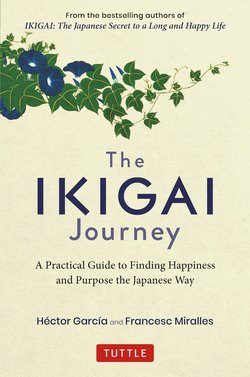Читать книгу The Ikigai Journey - Francesc Miralles - Страница 13
На сайте Литреса книга снята с продажи.
Оглавление5th STATION
FEEDBACK
How others see us
Having continuous feedback is one of the fundamental principles of engineering, whether it be for train improvements or for a moon mission. Feedback is the mirror that others show us to reflect our progress.
The scientific method is in fact based on “trial and error”; different solutions are tried out—like Edison when he was looking for the filament for his light bulb—and each failure leads to a new alternative until you finally see the light.
This is also applicable to the design of life itself. We can review each area of our life —relationships, career path, finances, cultural circle, etc.—and rate them individually from 1 to 10, depending on how satisfied we are.
The ones that rank low will require us to improve and adjust them, most likely through changing our habits, as we saw in the previous chapter.
Ask for negative feedback
When they asked Elon Musk—whose drive to innovate was discussed earlier in this book—about the secret of his success, he replied: “Pay attention to other people’s opinions…, especially the negative feedback from your family and friends.”
Getting or giving feedback is not always easy, since feelings can deceive us. Are you capable of telling a friend, to their face, what they are doing wrong? Are you capable of accepting negative criticism about a job you have devoted months of work to?
Never Give Unsolicited Advice
Often, when we see something in another person’s life that’s not working, we feel tempted to give our opinion, even though we haven’t been asked for it. In most cases, all our initiative does is cause the other person stress, since if they had wanted our advice, they would have asked for it.
What’s more, this unsolicited feedback may be perceived as criticism, putting the other person on the defensive and possibly generating resentment.
As far back as a century ago, Dale Carnegie was pointing out that criticism is very rarely welcome, since it attacks a person’s self-esteem. He claimed that much more is achieved through a positive stimulus— pointing out what they do well.
In those cases where criticism is necessary, because we have a sense of responsibility towards the other person—an employee, student or child —it is important that before we voice it, we prepare the way with praise that makes the recipient feel loved and valued.
Various studies have calculated that in personal and professional relationships the praise-to-criticism ratio is five to one.
When we receive negative feedback, we react instinctively by running away from it. We have trouble accepting it. Few people take the time to analyze what others tell them.
Of course, there is malicious criticism, which is the product of envy, but when several people point out the same problem or behavior, it is worthwhile to step back, look at things objectively, and take steps to make the needed changes.
If we want to take a qualitative leap forward in what we are doing, asking for negative feedback directly may be a big help. This means asking the right people—those we know will be sincere and will not feel obliged to praise us.
The key to getting useful feedback is to ask specific questions. If you ask: “What do you think of my latest photo exhibition?” you will almost certainly get generic answers along the lines of: “I love your photos,” or “Beautiful.”
You will learn nothing from this kind of reply. But if you ask a specific question: “Which of the exhibit’s twenty photos do you find the most bland and soulless?” you will get more precise answers and will know what to improve for the next time, especially if you ask why and listen to the answer carefully.
If you get the feeling they can help you with their feedback, probe for details: “Why do you think it’s bland?”
Getting good feedback allows us to make much faster progress developing our passion, our ikigai. In the absence of feedback, we run the risk of ending up lost in a sea of possibilities with our compass changing course every morning.
“Here is a golden rule of ethics: think for a moment whether you prefer to receive undeserved praise or receive no praise at all even though you deserve it.”
NASSIM NICHOLAS TALEB
Here are a few keys to getting the kind of feedback that will help you improve your life and get closer to your goals:
• Ask for it from people you admire and who know more about the subject than you do.
• Ignore criticism from people you don’t know and who know less about the subject than you do.
• Make the other person feel honored to give you feedback. Give credence to those who help you.
• In order to get specific feedback on a job or project, you can ask these three questions:
a. Can you tell me what you like the least? I won’t be offended.
b. What do you like the most?
c. And why do you like it?
If they don’t tell you exactly why, then forget it because it is not useful feedback.
The SKS approach: Stop, Keep doing, Start
According to Professor Phil Daniels of Brigham Young University, the three following questions are excellent ways of asking others for feedback.
The objective of these questions invite a fearless, honest response. The first one is very subtle because you are asking indirectly rather than directly what it is you are doing wrong:
1. What should I STOP doing?
____________________________________________
2. What should I KEEP doing?
____________________________________________
3. What should I START doing?
____________________________________________
The information you will get from these three questions will help you to speed up the pace of improvement in all areas of your life: work, personal relationships, hobbies, arts, business, etc. The shortest route to self-progress is to pay attention to negative feedback.
